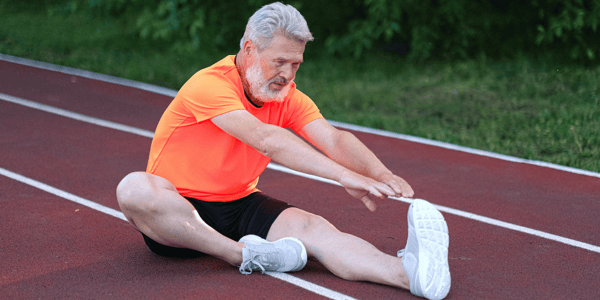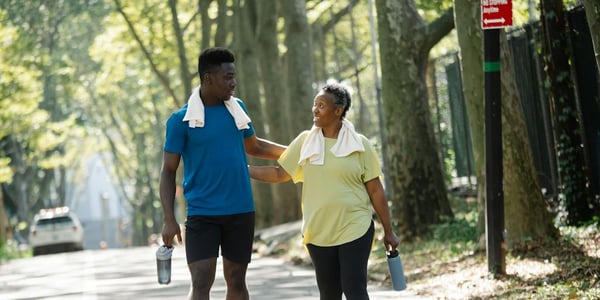According to the World Health Organization (WHO), approximately 1.7 billion people worldwide...


According to the World Health Organization (WHO), approximately 1.7 billion people worldwide...
.jpg?width=600&name=13%20Tips%20to%20Find%20Your%20Daily%20Exercise%20Motivation%20(1024%20x%20512%20px).jpg)
Exercise matters at any stage of life, but as we get older, it plays a bigger role in how we feel...

It's never too late to start or restart your fitness journey. As we reach age 50 and beyond,...
.jpg?width=600&name=7%20Ways%20to%20Make%20Exercising%20More%20Fun!%20(1024%20x%20512%20px).jpg)
We all know exercise is supposed to be good for us—but let’s be honest, it’s easy to see it as...
6 Tips to Stay Safe When Exercising Alone
Staying active is one of the best things you can do for your health, especially as the years go by. While group classes or workout partners can be great, they’re not always practical or easy to coordinate. For a lot of people, exercising alone ends up being the most realistic option. If that’s you, it’s important to take a few extra precautions to make sure your solo workouts stay safe. Below are some simple, effective tips to help you look out for yourself while still getting all the benefits of regular exercise.
Be Aware of Your Surroundings
Most of us probably don’t give much thought to personal safety when we work out, except perhaps for the safe use of equipment, such as using a spotter when lifting weights. Yet, how often do we think about our surrounding environment when exercising alone? Here are some questions to ask yourself.
When it comes to hearing, exercise extreme caution when wearing headphones and earbuds. This applies at any time of day. Not being able to hear an approaching vehicle or person increases risk dramatically. Consider leaving your earbuds or headphones at home or using "open-ear” devices, which help keep you better aware of your surroundings.
Upgrade your safety gear. From open-ear headphones to fitness trackers with fall detection, the right gear makes a difference. Use a Visa Signature Credit Card to conveniently cover your next safety-minded fitness purchase.
Click here or the button below to apply for a Visa Signature Credit Card with Dort Financial Credit Union!
Bring A Fully Charged Phone
If you're exercising alone, it's always a good idea to bring a fully charged phone with you. That way, if anything happens, you can easily call for help. Most smartphones also come with GPS location services pre-installed, allowing your family and friends to track your location and easily find you in an emergency. Also, consider carrying the phone in a protective container that you can easily access. For example, in a wet environment, the device will stay dry. Also, suppose you fall and can’t access the phone because it's at the bottom of a hiking pack. Having the phone in a front pocket or on a lanyard around your neck will make it much easier to access in an emergency.
Wear a Fitness Tracker or Smartwatch
Many active people wear a fitness tracker or smartwatch with exercise apps to monitor their progress. However, many of these devices have built-in safety features. For example, fall detection will automatically call for help if you fall and are incapacitated. The devices often have GPS location and “backtrack” features that help you retrace your steps if you get lost. Some smartwatches also have phone capabilities, allowing you to make calls directly from the device.
Let Someone Know Where You Are Going to Be
If you plan to exercise alone, it is essential to inform someone of your location and expected return time. This way, if something happens and you don't come back at the expected time, someone will know to come looking for you.
Choose A Public Location
When exercising alone, it's smart to choose a public spot where other people are present. This way, others can come to your aid if you run into trouble. Also, having others around typically discourages those who might harm you or your valuables. Some good places to exercise alone might include:
In all cases, however, check out the location first to ensure it is as safe as it appears to be.
Know Your Limits and Choose Safe Exercises
When working out alone, it's essential to know your limits and choose safe exercises. Begin by consulting with your doctor to determine the types of exercise that are safe for you. If you have any chronic health conditions, there may be certain activities that you should avoid. Then, once you have the green light from your doctor, it's time to get moving!
There are a few things to keep in mind when choosing exercises:
If you enjoy exercising alone, keep up the good work, but be sure to follow the safety precautions noted above. If you follow these basic guidelines, you’ll not only get closer to your fitness goals but also stay safe in the process. When you enjoy what you’re doing and feel confident doing it, sticking with it becomes much easier—and the benefits follow.
Create a safer home gym. If you’re planning to upgrade your space for safe workouts, a Money Market Account gives you better access to funds you’ve set aside.
Click here or the button below to unlock higher earnings with a Money Market Account from Dort Financial Credit Union.
Living50+